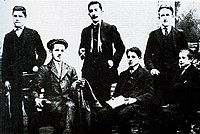Young Bosnia
| Mlada Bosna | |

Some of the members in 1911
|
|
| Formation | 1911 |
|---|---|
| Founder | Unknown |
| Extinction | after 28 June 1914 |
| Type | revolutionary organization |
| Purpose | creation of Yugoslavia through unification of Bosnia and Herzegovina with Serbia |
|
Key people
|
Gavrilo Princip |
| Affiliations | Narodna Odbrana and Black Hand |
Young Bosnia (Serbo-Croatian: Mlada Bosna, Serbian: Млада Босна) was a revolutionary movement active in the Condominium of Bosnia and Herzegovina before World War I. The members were predominantly school students, primarily Serbs, but also Bosniaks and Croats. There were two key ideologies promoted amongst the members of the group, the Yugoslavist (unification into a Yugoslavia), and the Pan-Serb (unification into Serbia). Young Bosnia was inspired from a variety of ideas, movements, and events; such as German romanticism, anarchism, Russian revolutionary socialism, Fyodor Dostoyevsky, Friedrich Nietzsche, and the Battle of Kosovo.
The rise to power of the popular Karađorđević dynasty in Serbia in the 1900s after the May Overthrow of the Obrenović dynasty by the Serbian Army in 1903, stimulated support by both Serbs and South Slavs for their unification into a state led by Belgrade. Support for revolutionary Yugoslavism in Bosnia grew with the rise of the Serbo-Croatian Progressive Organization in 1911, and drew in support for the cause from Serbs as well as Croats and some Muslims.
It was formed during the 1900s in the Condominium of Bosnia and Herzegovina (an annexed condominium of Austria-Hungary), with significant influence from neighbouring Serbia. The ideologue of Young Bosnia and tyrannicide as its method of the political struggle, was Vladimir Gaćinović. In one letter to Dedijer, one of revolutionaries from Herzegovina (Božidar Zečević) stated that the name of Young Bosnia was first mentioned by Petar Kočić in journal "Homeland" (Serbian: Отаџбина) in 1907. In 1911 Gaćinović published an article titled "Young Bosnia" in Almanac (Serbian: Алманах) published by Prosvjeta. The Serbian National Organization of Petar Kočić had ties with the Young Bosnia.
...
Wikipedia
